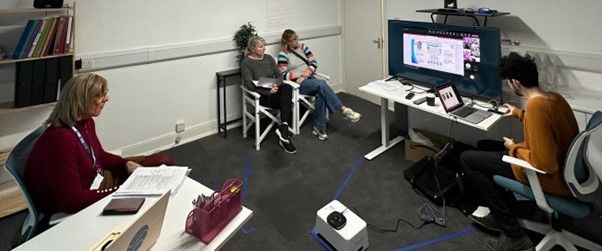
Live Online Delivery of “Forum Theatre: What Matters to Me”: Our Reflections and Lessons Learnt
Who are SimComm Academy?
SimComm Academy Ltd, established in 2016, is a specialist provider of health and social care simulation. We work with health and social care providers and education organisations, meeting needs through training, placements and exam support. Our delivery is both face to face and live online with participants from the following groups: registrants and non-registrants in health and social care organisations, students and trainees in healthcare programmes, professionals in primary, acute and community care, professionals in public and independent sector organisations.
SimComm Academy courses are designed to raise awareness and challenge both conscious and unconscious bias in order to support a diverse population and workforce. We incorporate a broad range of protected characteristics within our simulation scenarios. It is important to recognise that everyone is in a different place on their EDI journey and provide a safe and reflective space for participants to develop and enhance their allyship skills and awareness.
Live Online Delivery of “Forum Theatre: What Matters to Me”
During the first quarter of 2024, SimComm Academy delivered a series of forum theatre workshops live online to clinical professionals. Our facilitators and actor role players were based in the same location in our simulation studio in Romsey, undertaking scenarios, whilst the participants, from a large geographical radius, were interacting with the scenarios live online.
These workshops are designed to enable participants to consider the behaviours of healthcare staff and what drives these, including unconscious bias and judgement. The scenarios are truthful and anonymised, translated from patient and relative experiences. Forum theatre is used to explore how behaviour modification can impact on patient experience.
The course consists of 3 forum theatre scenarios in which participants observe the initial run through of the scenario without interruption. The scenario is then repeated, giving participants the opportunity to interrupt the scene and adapt the behaviour, language and communication of one of the characters with the aim to improve the experience of the patient. The first scenario is centred around a health visitor visiting a new mum who is struggling with feeding her baby. The second scenario is based on a parent attending the Accident and Emergency Department following a call from her child’s school that some safeguarding concerns have been raised and that she should meet them there. The final scenario is set within a GP surgery and shows a lived experience of an interaction between a GP and transgender patient.
The course ends with a series of monologues delivered by the characters involved in the above scenarios, centred around what matters to them as individuals. These monologues are then followed by a debrief.

Challenges and Resolutions Identified During the Trial Delivery:
Due to the sensitive nature of the topic and content, in addition to the added challenges of online delivery, we felt that it was important to undertake a trial delivery ahead of the first workshop. Several aspects for consideration were identified. These are outlined below:
Forum Theatre:
The usual process during the second observation of the scene would be for participants to call out stop when they wish to amend an actor’s behaviour, however we recognised that it was difficult for the facilitator to identify who had called stop and with multiple microphones unmuted, the background noise created additional interference.
Our resolution was to request that participants remain muted and raise their virtual hands to stop the scene. This enabled the facilitator to actively track which participants had raised their hands and in what order. It also allowed the facilitator to actively choose participants that may have not previously spoken but may have been third or fourth in raising their hands, enhancing inclusivity.
Monologues:
Participants are encouraged to share their reflections on the monologues, however in a virtual environment with 25 participants, the facilitator cannot always see everyone, which made it difficult to ensure that all participants had equal opportunity to feedback.
Our resolution for this was to use a waterfall process, whereby every participant was invited to type their thoughts and feelings into the chat, but not to press send until instructed to by the facilitator. This then created a cascade of responses that could be instantly seen by both the facilitator and the participants and similarities or differences further discussed.
Cameras:
It can often be challenging during online training to ensure that all participants’ cameras remain turned on. We found it helpful to remind participants of the reasons behind the importance of this, particularly when engaging in forum theatre. As in all methods of simulation training, psychological safety is key in forum theatre and ensuring that participants can see each other and have a sense of who each other are, reduces the sense of vulnerability when interrupting the scenarios and sharing their ideas, thus creating a safer, more trusting learning environment.
Feedback and Evaluation:
At the end of the course, participants were requested to type one pledge into the chat function outlining something they will change in the future rather than feeding back verbally as this enabled us to collate and anonymise the feedback.
We also conducted a formal evaluation which participants accessed via a QR code. A 41% increase was observed in the participants knowledge and understanding of the issues and behaviours that may impact patient experience.
For further information please contact Kirsten.howson@simcommacademy.com or visit Home | SimComm Academy